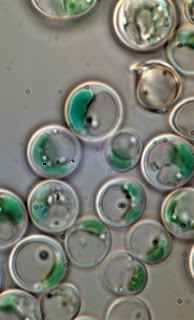 Jonathan Eisen is becoming one of my favorite bloggers. He alerts us to a horrible press release published recently by the National Science Foundation (USA):How to Thrive in Battery Acid and Among Toxic Metals.
Jonathan Eisen is becoming one of my favorite bloggers. He alerts us to a horrible press release published recently by the National Science Foundation (USA):How to Thrive in Battery Acid and Among Toxic Metals.
It talks about a strain of red algae called Galdieria sulphuraria that has apparently inherited many genes from bacteria by lateral gene transfer. Here's how the press release hypes the result ...The scientists made an unexpected discovery: Galdieria's genome shows clear signs of borrowing genes from its neighbors.
A "new mechanism of evolution" that was only revealed a decade ago by genome sequencing? Jonathan Eisen explains why this is so very wrong. You should read his post: Ugg - story about gene transfer/evolution based on NSF press release has a NASA-esque smell. I agree 100%. We've got to put and end to this kind of ridiculous hype and misrepresentation. It's damaging to science.1
Many genes that contribute to Galdieria's adaptations were not inherited from its ancestor red algae, but were acquired from bacteria or archaebacteria.
This "horizontal gene transfer" is typical for the evolution of bacteria, researchers say.
However, Galdieria is the first known organism with a nucleus (called a eukaryote) that has adapted to extreme environments based on horizontal gene transfer.
"The age of comparative genome sequencing began only slightly more than a decade ago, and revealed a new mechanism of evolution--horizontal gene transfer--that would not have been discovered any other way," says Matt Kane, program director in the National Science Foundation's (NSF) Division of Environmental Biology, which funded the research.
"This finding extends our understanding of the role that this mechanism plays in evolution to eukaryotic microorganisms."
Galdieria's heat tolerance seems to come from genes that exist in hundreds of copies in its genome, all descending from a single gene the alga copied millions of years ago from an archaebacterium.
"The results give us new insights into evolution," Schoenknecht says. "Before this, there was not much indication that eukaryotes acquire genes from bacteria."
The published results are interpreted as novel but only in the sense that the genes acquired from bacteria are (presumably) directly related to enhanced fitness (Schönknecht et al., 2013). Here's what the authors say in the paper.Eukaryotic innovations usually arise through gene duplications and neofunctionalizations, which lead to expansion of existing gene families (8). In contrast, archaea and bacteria commonly adapt through horizontal gene transfer (HGT) from other lineages (9). HGT has also been observed in some unicellular eukaryotes (10); however, to our knowledge, horizontally acquired genes have not been linked to fitness-relevant traits in free-living eukaryotes
That point is reiterated in the summary.These findings for G. sulphuraria mirror the results of a previous systematic study, which showed that proteobacterial adaptation relies on the horizontal acquisition of genes that function at the bacteria's interface to the environment (19). Whereas the importance of HGT for evolution of Bacteria and Archaea is well established, adaptation of a eukaryotic extremophile by gene transfer from Bacteria and Archaea is unexpected and shines a new light on the evolution of unicellular eukaryotes.
There's nothing about a new mechanism of evolution in the actual paper. [Image Credit: Gerald Schönknecht]
1. Ed Yong gets it right: How the Lord of the Springs Survives Where Most Things Die, demonstrating, once again, that good science writers can cut through the hype and lies.
Schönknecht, G., Chen, W.H., Ternes, C.M., Barbier, G.G., Shrestha, R.P., Stanke, M., Bräutigam, A., Baker, B.J., Banfield, J.F., Garavito, R.M., Carr, K., Wilkerson, C., Rensing, S.A., Gagneul, D., Dickenson, N.E., Oesterhelt, C., Lercher, M.J., and Weber, A.P. (2013) Gene Transfer from Bacteria and Archaea Facilitated Evolution of an Extremophilic Eukaryote. Science 339:1207-1210. [PubMed] [doi: 10.1126/science.1231707]
Resep Martabak Manis
-
Resep Martabak Manis - Kali kami akan memberikan resep terbaru tentang cara
membuat martabak manis, resep martabak manis ini sangat sederhana sehingga
muda...
11 years ago



.JPG)




.jpg)

dbl.jpg)
